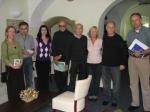Institute History
Home » Institute History »
It became apparent that research of the Communist period of Czechoslovak history — an era exposed to permanent ideological supervision, screening, and censorship — was a present and urgent need of the post-November society. All-round knowledge and understanding of its Communist past was perceived by society as one of the preconditions for its joining the European democratic community. Gradually, new issues and tasks increased in number: history of the occupation and resistance; research in Czech-Slovak relations in view of the demise of Czechoslovakia in 1992; history of the November Revolution and the first years of the political, economic, and social transformation. The boundaries of “contemporary history” as a scientific discipline shifted with each historical turning point. Nowadays, the transformation period up to the Czech Republic’s membership of NATO and the European Union represents a new, independent subject of research and a further challenge in historical research.
The ICH, already by its name, endorses the concept of contemporary history as an independent discipline within the framework of the historical sciences (Zeitgeschichte, contemporary history, l’histoire contemporaine or l’histoire du temps present, etc.) with a distinct interdisciplinary approach to research, in particular by combining historiography, the political sciences, sociology, philosophy, cultural anthropology and ethnology or oral history.
Publication activities were launched immediately upon the establishment of the Institute by, among other things, founding the following editorial series: The ICH Notebooks (since 1990), The Sources of the History of the Czechoslovak 1967-1970 Crisis (since 1993), The Testimony of Time and People (since 1992), The Voices of the Past (since 2003), and Czech Society After 1945 (since 2004). Since 1993, the Institute has been editing the quarterly Contemporary History.
Nine departments are active at the ICH:
1. Department for History of the Second World War, Resistance and Occupation
2. Department for Research in Major Isues of the 1945-1989 Period
3. Department for Post-1989 History
4. Department of Jewish Studies
5. Department for History of Science
6. Oral History Centre
7. Library and Documentation Centre
8. Editorial and Publishing Department
9. The Contemporary History Editorial Board
The Centre for Documentation of Property Transfers of the Cultural Assets of World War II Victims acts as an independent section with a specific mission. The Brno subsidiary of the ICH was established in 2002.
Apart from engaging in proper research and creating material conditions for research-related work, the ICH participates in educational and publication activities for the broader public. The ICH fellows — individually and within the framework of inter-institutional cooperation — lecture on modern history at a broad range of universities in Prague and Brno. In cooperation with the media, the ICH attends to the renewal and expansion of Czech society’s historical memory. Since its very beginning, the ICH has been building up its library of domestic and foreign books and journals on contemporary history, which is accessible to both researchers and the public.
At the beginning of the 1990s, the ICH began to cooperate systematically with numerous institutions of similar orientation throughout Europe and North America. Within the framework of such cooperation, the Institute organised and co-organised numerous large-scale international conferences, and its fellows participated in several important joint international research projects.



